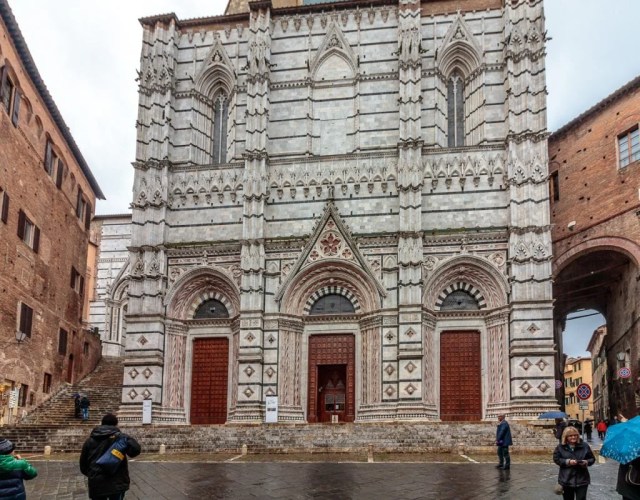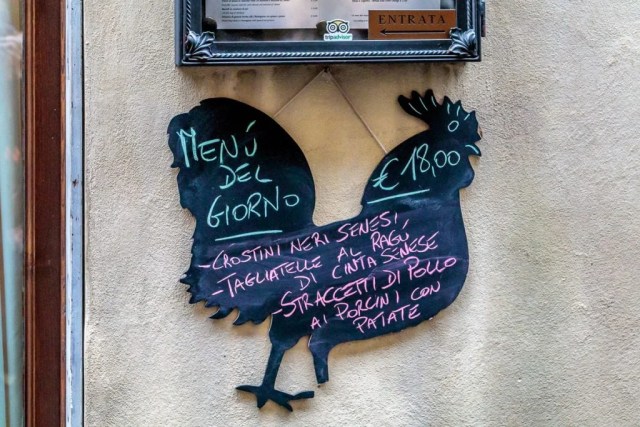Battistero di San Giovanni (Baptistery of Saint John) was built between 1316 and 1325 by Camaino di Crescentino. Recall from a post from Florence that you were not baptized inside the church, but in a separate building.


Siena is another great city for food. Here’s the local butcher’s shop.


Here is a “menu of the day” posted just down the street.
Today’s special is crostini neri senesi, tagliatelle al ragu di cinta senese, straccetti di pollo al porcini con patate – Siena blacks croutons, tagliatelle (a long, flat pasta) with meat sauce from the local Sienese pigs, sliced chicken with mushrooms and potatoes. The crostini neri senesi is a sauce made from veal, chicken livers, onion, oil, capers, anchovies, and spread on lightly toasted homemade bread croutons. All this for only 18 euro. Sounds good. I also see this place is listed on Trip Advisor.

The black rooster has an interesting story in the history of Siena and Florence and where the border between them was drawn. Rather than reproduce the story here, please check out the story here.
Here are a couple more doors and doorways.
This is the office of a dental surgeon.
We went past a bakery. The cake in the second image is a local seasonal treat for All Saint’s Day. It is a peppered fruit cake.
Remember the post describing the Palio, the horse race through town? Here are some flags commemorating this event.

Banca Monte dei Paschi di Siena is the oldest surviving bank in the world, founded in 1472 and has been in continuous operation since. Siena was a great place for a bank in the 1400s being located between Rome and Florence. Italy was not a single unified country as we know it today, but was made up of independent states, each with their own currency. Travelers from one region to another would need to exchange currency, just as we do with US dollars and euros.

The statue in front of the bank is Sallustio Bandini (1677 – 1760). He was an Italian archdeacon, economist, and politician and was an advocate of free trade, and removal of local feudal tariffs and tolls. The inscription reads “che le dottrine della liberta economica insegno primo per la prosperita dei popoli cento venti anni dopo la sua morte il monte dei paschi plaudente la cittadinanza senese” which translates roughly to “The doctrines of economic freedom teach first the prosperity of the peoples. One hundred and twenty years after his death on the mountain pastures of cheering the Sienese citizenship.”

Some additional scenes along the way.
Next time, I’ll show you a bit about where Saint Catherine spent her time.
Mark















Very beautiful ~ so very much like Orvieto with produce hanging in the small shop windows, the streets, the architecture, etc.